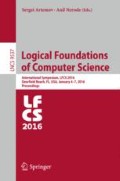Abstract
We study intransitive temporal logic implementing multi-agent’s approach and formalizing knowledge and uncertainty. An innovative point here is usage of non-transitive linear time and multi-valued models - the ones using separate valuations \(V_j\) for agent’s knowledge of facts and summarized (agreed) valuation together with rules for computation truth values for compound formulas. The basic mathematical problems we study here are - decidability and decidability w.r.t. admissible rules. First, we study general case - the logic with non-uniform intransitivity and solve its decidability problem. Also we consider a modification of this logic - temporal logic with uniform non-transitivity and solve problem of recognizing admissibility in this logic.
Access this chapter
Tax calculation will be finalised at checkout
Purchases are for personal use only
References
Artemov, S., Kuznets, R.: Logical omniscience as infeasibility. Ann. Pure Appl. Logic 165, 6–25 (2014)
Artemov, S.: Justified common knowledge. Theor. Comput. Sci. 357, 4–22 (2006)
Artemov, S., Nogina, E.: Introducing justification into epistemic logic. J. Logic Comput. 15, 1059–1073 (2005)
Babenyshev, S., Rybakov, V.: Linear temporal logic LTL, basis for admissible rules. J. Logic Comput. 21, 1057–177 (2011)
Belardinelli, F., Lomuscio, A.: Interactions between knowledge and time in a first-order logic for multi-agent systems: completeness results. J. Artif. Intell. Res. 45, 1–45 (2012)
Balbiani, P., Vakarelov, D.: A modal logic for indiscernibility and complementarity in information systems. Fundam. Inform. 50, 243–263 (2002)
Fagin, R., Halpern, J., Moses, Y., Vardi, M.: Reasoning About Knowledge. MIT Press, Cambridge (1995)
Friedman, H.: One hundred and two problems in mathematical logic. J. Symbolic Logic 40, 113–130 (1975)
Gabbay, D.M., Hodkinson, I.M., Reynolds, M.A.: Temporal Logic: Mathematical Foundations and Computational Aspects. Clarendon Press, Oxford (1994)
Gabbay, D.M., Hodkinson, I.M.: An axiomatization of the temporal logic with until and since over the real numbers. J. Logic Comput. 1, 229–260 (1990)
Gabbay, D., Hodkinson, I.: Temporal logic in context of databases. In: Copeland, J. (ed.) Logic and Reality, Essays on the legacy of Arthur Prior. Oxford University Press, Oxford (1995)
Halpern, J., Samet, D., Segev, E.: Defining knowledge in terms of belief. Modal Logic Perspect. Rev. Symbolic Logic 2, 469–487 (2009)
Hintikka, J.: Knowledge and Belief: An Introduction to the Logic of the Two Notions. Cornell University Press, Ithaca (1962)
Lomuscio, A., Michaliszyn, J.: An epistemic halpern-shoham logic. In: Proceedings of the 23rd International Joint Conference on Artificial Intelligence (IJCAI 2013), pp. 1010–1016. AAAI Press, Beijing (2013)
McLean, D., Rybakov, V.: Multi-agent temporary logic \( TS4^U_{K_n}\) based at non-linear time and imitating uncertainty via agents’ interaction. In: Rutkowski, L., Korytkowski, M., Scherer, R., Tadeusiewicz, R., Zadeh, L.A., Zurada, J.M. (eds.) ICAISC 2013, Part II. LNCS, vol. 7895, pp. 375–384. Springer, Heidelberg (2013)
Odintsov, S., Rybakov, V.: Inference rules in Nelson’s logics, admissibility and weak admissibility. Logica Univers. 9, 93–120 (2015)
Rybakov, V.V.: Refined common knowledge logics or logics of common information. Arch. Math. Logic 42, 179–200 (2003)
Rybakov, V.V.: Logical consecutions in discrete linear temporal logic. J. Symbolic Logic 70, 1137–1149 (2005)
Rybakov, V.V.: Linear temporal logic with until and next, logical consecutions. Ann. Pure Appl. Logic 155, 32–45 (2008)
Rybakov, V.: Logic of knowledge and discovery via interacting agents - decision algorithm for true and satisfiable statements. Inf. Sci. 179, 1608–1614 (2009)
Rybakov, V.: Linear temporal logic \(LTL_{K_n}\) extended by multi-agent logic \(K_n\) with interacting agents. J. Logic Comput. 19, 989–1017 (2009)
Rybakov, V., Babenyshev, S.: Multi-agent logic with distances based on linear temporal frames. In: Rutkowski, L., Scherer, R., Tadeusiewicz, R., Zadeh, L.A., Zurada, J.M. (eds.) ICAISC 2010, Part II. LNCS, vol. 6114, pp. 337–344. Springer, Heidelberg (2010)
Rybakov, V.V.: Chance discovery and unification in linear modal logic. In: König, A., Dengel, A., Hinkelmann, K., Kise, K., Howlett, R.J., Jain, L.C. (eds.) KES 2011, Part II. LNCS, vol. 6882, pp. 478–485. Springer, Heidelberg (2011)
Rybakov, V.V.: Logical analysis for chance discovery in multi-agents’ environment. In: Graña, M., et al. (eds.) Frontiers in Artificial Intelligence and Applications, vol. 243, pp. 1593–1601. Springer, Heidelberg (2012)
Rybakov, V.: Non-transitive linear temporal logic and logical knowledge operations. J. Logic Comput. (2015). doi:10.1093/logcom/exv016
Vardi, M.: An automata-theoretic approach to linear temporal logic. In: Moller, F., Birtwistle, G. (eds.) Logics for Concurrency. LNCS, vol. 1043, pp. 238–266. Springer, Heidelberg (1995). http://citeseer.ist.psu.edu/vardi96automatatheoretic.htm
Vardi, M.Y.: Reasoning about the past with two-way automata. In: Larsen, K.G., Skyum, S., Winskel, G. (eds.) ICALP 1998. LNCS, vol. 1443, pp. 628–641. Springer, Heidelberg (1998)
Vakarelov, D.: A modal characterization of indiscernibility and similarity relations in Pawlak’s information systems. In: Slezak, D., Wang, G., Szczuka, M.S., Düntsch, I., Yao, Y. (eds.) RSFDGrC 2005. LNCS (LNAI), vol. 3641, pp. 12–22. Springer, Heidelberg (2005)
Wooldridge, M.J., Lomuscio, A.: Multi-agent VSK logic. In: Brewka, G., Moniz Pereira, L., Ojeda-Aciego, M., Guzmán, I.P. (eds.) JELIA 2000. LNCS (LNAI), vol. 1919, pp. 300–312. Springer, Heidelberg (2000)
Wooldridge, M.: An automata-theoretic approach to multi-agent planning. In: Proceedings of the First European Workshop on Multi-agent Systems (EUMAS 2003). Oxford University (2003)
Wooldridge, M., Huget, M., Fisher, M., Parsons, S.: Model checking multi-agent systems: the MABLE language and its applications. Int. J. Artif. Intell. Tools 15, 195–225 (2006)
Author information
Authors and Affiliations
Corresponding author
Editor information
Editors and Affiliations
Rights and permissions
Copyright information
© 2016 Springer International Publishing Switzerland
About this paper
Cite this paper
Rybakov, V. (2016). Intransitive Temporal Multi-agent’s Logic, Knowledge and Uncertainty, Plausibility. In: Artemov, S., Nerode, A. (eds) Logical Foundations of Computer Science. LFCS 2016. Lecture Notes in Computer Science(), vol 9537. Springer, Cham. https://doi.org/10.1007/978-3-319-27683-0_25
Download citation
DOI: https://doi.org/10.1007/978-3-319-27683-0_25
Published:
Publisher Name: Springer, Cham
Print ISBN: 978-3-319-27682-3
Online ISBN: 978-3-319-27683-0
eBook Packages: Computer ScienceComputer Science (R0)

